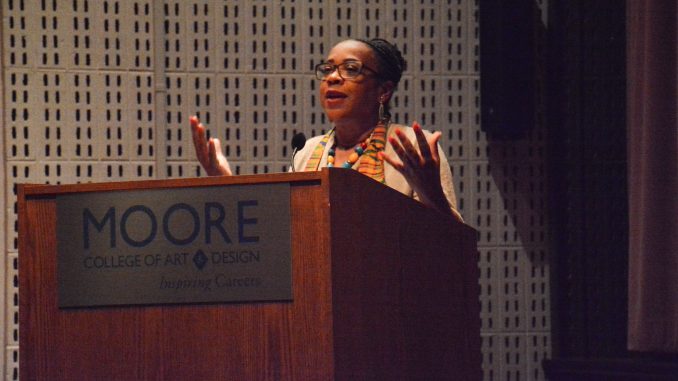
Debra Zimmerman still remembers the first time she saw a documentary created by a woman.
“That experience of seeing experiences on screen that reflected my life was really transformative,” said Zimmerman, the executive director of Women Make Movies, a nonprofit organization that addresses the underrepresentation of women in the film industry. “I wanted to do something to make sure there were more images like that on screen.”
This past weekend, Moore College of Art and Design continued the legacy of women visual artists and filmmakers by holding the MooreWomenArtists Film Festival. Zimmerman helped to co-curate the festival, sending the college a list of suggestions for films to screen.
Roy Wilbur, the director of marketing and communications for the Moore College, said the name of the festival was derived from the website MooreWomenArtists.com, which was created last year to be an online space for women artists to discuss their ideas, experiences and histories as women artists.
“It’s sort of a play on words, you know, ‘Moore women,’ but also more women, to really focus on women artists and opportunities to raise the profile of women artists out there working, because a lot of them are not getting their due in terms of the work that they’re getting or the pay that they’re getting and so on,” Wilbur said. “So this festival really just came up as an idea to really, once again, continue celebrating our legacy [as a women’s college of art] but also focusing on that as well.”
Over three days, six different films were presented, all created by women about women artists. The only exception was the last movie “Alice Neel,” which is about an alumna from the college and was directed by the artist’s grandson, Andrew Neel.
“It’s also an opportunity here at the college to really give our students a chance to look at the lives of other artists who are working out there and learn from their experiences,” Wilbur said. “And so it’s really tied to the education that we’re giving our students as well.”
“Conjure Women,” directed by Demetria Royals, documents the artistry of four African-American women artists. “Learning to Swallow,” a documentary directed by Danielle Beverly, follows an artist as she learns to live with the physical consequences of her suicide attempt.
Wilbur said he met Zimmerman beforehand to discuss how the organization could be more involved with the MooreWomenArtists website, when the idea for a film festival became more realistic. Zimmerman then sent her suggestions and the movies were narrowed down.
Each screening was preceded by an introductory speaker, who had some form of connection to the films they were introducing. Zimmerman presented “Guerrillas In Our Midst,” a film directed by Amy Harrison, and “The Heretics,” created by Joan Braderman.
Both of the films Zimmerman introduced were products of the Women Make Movies production system program, which was created in the 1980s to help give women the tools, skills and information they would need to get their films made.
“‘Guerrillas In Our Midst’ is about the work of the Guerrilla Girls, a really amazing group of women who are trying to get the art world to be more cognizant of the inequities facing women artists,” Zimmerman said. “And even though the film was made quite a while ago it’s still very relevant. Unfortunately things haven’t changed all that much.”
Diane Burko, an artist who spoke before the screening of “Alice Neel,” said she met Alice during the women’s movement in the 1970s. She felt her personal experience with the women’s art movement would be appropriate for the discussions the movie would prompt.
“When I was in my 20’s I organized an all-city festival in Philadelphia which was called ‘Philadelphia Focuses on Women in the Visual Arts,’” Burko said. “And it was called FOCUS and that was a city-wide event where universities, museums displayed art by women artists.”
It’s important for women filmmakers and artists to make films and art about women, Zimmerman said, because “it’s a corrective to the way that women are represented both in art and in film.”
“If there was a more accurate representation of women in the films that were made by men, it might be less important … but when men represent women it’s through their eyes,” she added. “Just like when women represent men, it’s through women’s eyes. So because of that and because women’s issues, especially in documentary, are not covered in mainstream media, it is important for women to focus on that.”
Morgan Slutzky can be reached at morgan.slutzky@temple.edu.


Be the first to comment